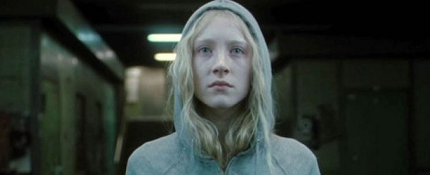 I don't know what kind of world the real Michael Moore lives in. Considering his fame and success as a documentary filmmaker, it's probably a bit plush, already a great irony of the content of his films, exercises in "Power to the People!," working class love. But I'm willing to grant him his success (how nice of me, right?) and have faith that he's not irresponsible with his status and fortune, that he truly does care about the poor and downtrodden, that he's not exploiting their plight for his own benefit.
I don't know what kind of world the real Michael Moore lives in. Considering his fame and success as a documentary filmmaker, it's probably a bit plush, already a great irony of the content of his films, exercises in "Power to the People!," working class love. But I'm willing to grant him his success (how nice of me, right?) and have faith that he's not irresponsible with his status and fortune, that he truly does care about the poor and downtrodden, that he's not exploiting their plight for his own benefit.However, the world that "Michael Moore," the somewhat fictionalized version of himself that he plays in his films, the P.T. Barnum of the documentary film - showman, stuntman, comedian, philosophizer - I'm not sure that I live in the same world that he does. Don't take this to mean that there aren't several truths within Capitalism, it's just that the capitalism on display in Moore's film might well be the boogeyman. It's everywhere and nowhere. It's responsible for not just the financial collapse we've seen over the last 12 months, and for layoffs the country over, but for plane crashes, for personal fiscal responsibility, for our country's war with Iraq (okay, that one might be valid). Have you lever lost your keys? Capitalism might just be the culprit.
I exaggerate, but I'm just mimicking Moore. As usual, his intentions are just and true. He looks around the country (specifically the upper Midwest - again, as usual) and sees an economy where companies post (or posted) billions in profits on the one hand while laying off workers on the other. He sees the gross practices of blue chip companies in which they take out insurance policies on their own employees, leaving them with incentive to have dead workers (disgustingly called Dead Peasants), all the while not handing a dime to the employees' next of kin. He sees the Goldman Sachs takeover of the Treasury Department and the bailout of the largest banks in the country - with no oversight, of course (read Matt Taibbi's great, maddening Rolling Stone article about it here) - and wonders why they get help yet 250 lower-income workers are fired abruptly - with no severance - due to poor management decisions. He sees all of this and is righteously pissed, wondering what happened to the middle-class Utopian era of the 50s and 60s.
That's kind of where the problem comes in, though. Moore gets so angered that it seems as though he closes his eyes, spins in a circle, opens his eyes, and whatever he happens to be looking at when he's stopped will be the latest target of his vitriol. Capitalism, like all of his previous films, works as an entertaining, foot-stomping, piece of propaganda meant to awaken you from your slumber, to remove the blinders that big business and/or the government have placed over your eyes (if they're still there). Thankfully, we're spared outlandish stunts akin to the Gitmo trip made in Sicko, though at one point Moore does drive an armored truck up to the Treasury Department and various banks asking for money back for the American taxpayer. Still, the focus of his opus, Bowling for Columbine, isn't there.
Amongst the many "peasants" that Moore talks to is an Illinois family, on their way to being evicted from the farm that's been in their family for generations. The father talks about his frustration with the situation, at one point exclaiming that he understands why other desperate individuals in dire straits like his might turn to bank robbery, stopping just short of saying that he'd like to do the same. It was with some irony and delight then, that when documenting the sit-in protest (and subsequent "victory") of those 250 laid-off workers, that a steel drum-heavy (?) song sounding a lot like Hans Zimmer's True Romance theme "You're So Cool" started playing. It's a big stretch, but I couldn't help but think of Clarence Worley, that poor Detroit kid so frustrated with the plight of he and his newlywed wife that he ended up stealing a pot of white gold, eventually making his way to Mexico. Moore has no intention of fleeing to a foreign land; he's just getting settled in for a fight for his country, and he wants you to join him. You ought to, even if you shouldn't take his every word as gospel.
 | "Darn tootin!" |
| Shaky Cam Rating (details): | LAMBScore: |
 |  |


























2 people have chosen wisely: on "Fletch's Film Review: Capitalism: A Love Story"
"...the capitalism on display in Moore's film might well be the boogeyman. It's everywhere and nowhere."
Very well said! This is the least focused and most randomly argued doc that Moore has ever made, I think. It has some moments that are, in and of themselves, impossible to argue. But the rest is just .... meh.
Ha, yes, I'm going to blame capitalism for the traffic this morning, and for burning my tongue on my coffee.
Oh, and the fact that I'm not a millionaire. Funny how that works.
I still think Moore really could have made something out of this had he turned the lens on the people and the culture as much as the CEOs and the government. But it's always about blaming the big guys, isn't it.
Post a Comment